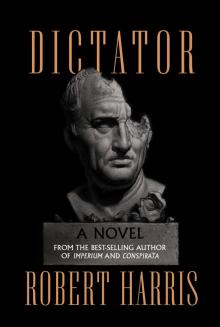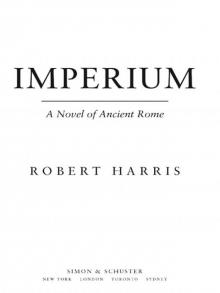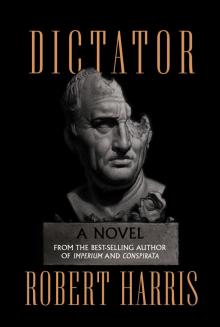- Home
- Robert Harris
Dictator: Page 4
Dictator: Read online
Page 4
He was still undecided when he retired for the night, and the following morning, when Milo called to ask him what answer he should take back to Pompey, I could not have predicted what he would say. ‘You can tell him this,’ responded Cicero. ‘That my whole life has been dedicated to the service of the state, and that if the state demands of me that I should reconcile with my enemy – then reconcile I shall.’
Milo embraced him and then immediately set off back to the coast in his war chariot with his gladiator standing beside him – such a pair of brutes longing for a fight that one could only tremble for Rome and all the blood that was bound to be spilt.
It was settled that I should leave Thessalonica on my mission to Caesar at the end of the summer, as soon as the military campaigning season was over. To have set off before then would have been pointless, as Caesar was with his legions deep inside Gaul, and his habit of rapid forced marches made it impossible to say with any certainty where he might be.
Cicero spent many hours working on his letter. Years later, after his death, our copy was seized by the authorities, along with all the other correspondence between Cicero and Caesar, presumably in case it contradicted the official history that the Dictator was a genius and that all who opposed him were stupid, greedy, ungrateful, short-sighted and reactionary. I assume it has been destroyed; at any rate, I have never heard of it since. However, I still possess my shorthand notes, covering most of the thirty-six years I worked for Cicero – such a vast mass of unintelligible hieroglyphics that the ignorant operatives who ransacked my archive doubtless assumed them to be harmless gibberish and left them untouched. It is from these that I have been able to reconstruct the many conversations, speeches and letters that make up this memoir of Cicero – including his humiliating appeal to Caesar that summer, which is not lost after all.
Thessalonica
From M. Cicero to G. Caesar, Proconsul, greetings.
I hope you and the army are well.
Many misunderstandings have unfortunately arisen between us in recent years but there is one in particular which, if it exists, I wish to dispel. I have never wavered in my admiration for your qualities of intelligence, resourcefulness, patriotism, energy and command. You have justly risen to a position of great eminence in our republic, and I wish only to see your efforts crowned with success both on the battlefield and in the counsels of state, as I am sure they will be.
Do you remember, Caesar, that day when I was consul, when we debated in the Senate the punishment of those five traitors who were plotting the destruction of the republic, including my own murder? Tempers were high. Violence was in the air. Each man distrusted his neighbour. Suspicion even unjustly fell upon you, astonishingly, and had I not intervened, the flower of your glory might have been cut off before it had a chance to bloom. You know this to be true; swear otherwise if you dare.
The wheel of fate has now reversed our positions, but with this difference: I am not a young man now, as you were then, with golden prospects. My career is over. If the Roman people were ever to vote for my return from exile, I should not seek any office. I should not put myself at the head of any party or faction, especially one injurious to your interests. I should not seek to overturn any of the legislation enacted during your consulship. In what little earthly time remains to me, my life will be devoted solely to restoring the fortunes of my poor family, supporting my friends in the law courts, and rendering such service as I can to the well-being of the commonwealth. On this you may rest assured.
I am sending you this letter via my confidential secretary M. Tiro, whom you may remember, and who can be relied upon to convey in confidence any reply you may wish to make.
‘Well, there it is,’ said Cicero, when it was finished, ‘a shameful document, and yet if one day it were to be read aloud in court, I don’t believe I would need to blush too deeply.’ He copied it out carefully in his own hand, sealed it, and handed it to me. ‘Keep your eyes open, Tiro. Observe how he seems and who is with him. I want an exact account. If he asks after my condition, hesitate, speak with reluctance, and then confide that I am utterly broken in body and spirit. The more certain he is I’m finished, the more likely he is to let me return.’
By the time the letter was done, our situation had in fact become much more precarious again. In Rome, the senior consul, Lucius Calpurnius Piso, who was Caesar’s father-in-law and an enemy of Cicero’s, had been awarded the governorship of Macedonia in a public vote rigged by Clodius. He would take office at the start of the new year: an advance guard from his staff was expected in the province shortly. If they caught Cicero they might kill him on the spot. Another door was starting to close on us. My departure could no longer be put off.
I dreaded the emotion of our parting, and so, I knew, did Cicero; therefore we colluded to avoid it. On the night before I left, when we had dined together for the final time, he pretended to be tired and retired to bed early, while I assured him I would wake him in the morning to say a final goodbye. In fact I slipped away before dawn, while the house was still in darkness, without a fuss, as he would have wanted.
Plancius had arranged an escort to conduct me back over the mountains to Dyrrachium, and there I took ship and sailed to Italy – not straight across to Brundisium this time, but north-west, to Ancona. It was a much longer voyage than our original crossing and took almost a week. But it was still quicker than going overland, with the added advantage that I would not encounter any of Clodius’s agents. I had never before travelled such a long distance on my own, let alone by ship. My terror of the sea was not the same as Cicero’s – of shipwreck and of drowning. It was rather of the vast emptiness of the horizon during the day and the glittering, indifferent hugeness of the universe at night. I was at this time forty-six, and conscious of the void into which we all are voyaging; I thought of death often while sitting out on deck. I had witnessed so much; ageing in body though I was, in spirit I was even older. Little did I realise that actually I had lived less than half my life, and was destined to see things that would make all the wonders and dramas that had gone before seem quite pallid and insignificant.
The weather was favourable, and we landed at Ancona without incident. From there I took the road north, crossing the Rubicon two days later and formally entering the province of Nearer Gaul. This was territory familiar to me: I had toured it with Cicero six years earlier, when he was seeking election as consul and canvassing the towns along the Via Aemilia. The vineyards beside the road had all been harvested weeks before; now the vines were being cut back for winter, so that as far as one could see, columns of white smoke from the burning vegetation were rising over the flat terrain, as if some retreating army had scorched the earth behind it.
In the little town of Claterna, where I stayed the night, I learned that the governor had returned from beyond the Alps and had set up his winter headquarters in Placentia, but that with typical restless energy he was already touring the countryside holding assizes: he was due in the neighbouring town of Mutina the next day. I left early, reached it at noon, passed through the heavily fortified walls, and made for the basilica on the forum. The only clue to Caesar’s presence was a troop of legionaries at the entrance. They made no attempt to ask my business, and I went straight inside. A cold grey light from the clerestory windows fell upon a hushed queue of citizens waiting to present their petitions. At the far end – too far away for me to make out his face – seated between pillars, dispensing judgement from his magistrate’s chair, in a toga so white it stood out brightly amid the locals’ drab winter plumage, was Caesar.
Uncertain how to approach him, I found myself joining the line of petitioners. Caesar was issuing his rulings at such a rate that we shuffled forwards almost continuously, and as I drew closer I saw that he was doing several things at once – listening to each supplicant, reading documents as they were handed to him by a secretary, and conferring with an army officer who had taken off his helmet and was bending down to whisper in his ear. I took out
Cicero’s letter so that I would have it ready. But then it struck me that this was not perhaps the proper place to hand over the appeal: that it was unconducive somehow to the dignity of a former consul for his request to be considered alongside the domestic complaints of all these farmers and tradespeople, worthy folk though they no doubt were. The officer finished his report, straightened, and was just walking past me towards the door, fastening his helmet, when his eyes met mine and he stopped in surprise. ‘Tiro?’
I glimpsed his father in him before I could put a name to the young man himself. It was M. Crassus’s son, Publius, now a cavalry commander on Caesar’s staff. Unlike his father he was a cultured, gracious, noble man, and an admirer of Cicero, whose company he used to seek out. He greeted me with great affability – ‘What brings you to Mutina?’ – and when I told him, he volunteered at once to arrange a private interview with Caesar and insisted I accompany him to the villa where the governor and his entourage were staying.
‘I’m doubly glad to see you,’ he said as we walked, ‘for I’ve often thought of Cicero, and the injustice done to him. I’ve talked to my father about it and persuaded him not to oppose his recall. And Pompey, as you know, supports it too – only last week he sent Sestius, one of the tribunes-elect, up here to plead his cause with Caesar.’
I could not help observing, ‘It seems that everything these days depends upon Caesar.’
‘Well, you have to understand his position. He feels no personal animosity towards your master – very much the opposite. But unlike my father and Pompey, he’s not in Rome to defend himself. He’s concerned about losing political support while his back is turned, and being recalled before his work here is complete. He sees Cicero as the greatest threat to his position. Come inside – let me show you something.’
We passed the sentry and went into the house, and Publius conducted me through the crowded public rooms to a small library where, from an ivory casket, he produced a series of dispatches, all beautifully edged in black and housed in purple slip-cases, with the word Commentaries picked out in vermilion in the title line.
‘These are Caesar’s own personal copies,’ Publius explained, handling them carefully. ‘He takes them with him wherever he goes. They are his record of the campaign in Gaul, which he has decided to send regularly to be posted up in Rome. One day he intends to collect them all together and publish them as a book. It’s perfectly marvellous stuff. See for yourself.’
He plucked out a roll for me to read:
There is a river called the Saone, which flows through the territories of the Aedui and Sequani into the Rhone with such incredible slowness that it cannot be determined by the eye in which direction it flows. This the Helvetii were crossing by rafts and boats joined together. When Caesar was informed by spies that the Helvetii had already conveyed three parts of their forces across that river, but that the fourth part was left behind on this side of the Saone, he set out from the camp with three legions. Attacking them, encumbered with baggage, and not expecting him, he cut to pieces a great part of them …
I said, ‘He writes of himself with wonderful detachment.’
‘He does. That’s because he doesn’t want to sound boastful. It’s important to strike the right note.’
I asked if I might be allowed to copy some of it, and show it to Cicero. ‘He misses the regular news from Rome. What reaches us is sparse, and late.’
‘Of course – it’s all public information. And I’ll make sure you get in to see Caesar. You’ll find he’s in a tremendously good mood.’
He left me alone and I settled to work.
Even allowing for a degree of exaggeration, it was plain from the Commentaries that Caesar had enjoyed an astonishing run of military successes. His original mission had been to halt the migration of the Helvetii and four other tribes who were trekking westwards across Gaul to the Atlantic in search of new territory. He had followed their immense column, which consisted both of fighting men and of the elderly and women and children, with a new army he had mostly raised himself of five legions. Finally he had lured them into battle at Bibracte. As a guarantee to his new legions that neither he nor his officers would abandon them if things went wrong, he had all their horses sent far away to the rear. They fought on foot with the infantry, and in the event Caesar, by his own account, did not merely halt the Helvetii – he slaughtered them. Afterwards a list giving the total strength of the migration had been discovered in the enemy’s abandoned camp:
Helvetii 263,000
Tulingi 36,000
Latobrigi 14,000
Rauraci 23,000
Boii 32,000
368,000
Of these, according to Caesar, the total number who returned alive to their former homeland was 110,000.
Then – and this was what no one else surely would have dreamed of attempting – he had force-marched his weary legions back across Gaul to confront 120,000 Germans who had taken advantage of the Helvetii’s migration to cross into Roman-controlled territory. There had been another terrific battle, lasting seven hours, in which young Crassus had commanded the cavalry, and by the end of it the Germans had been entirely annihilated. Hardly any had been left alive to flee back across the Rhine, which for the first time became the natural frontier of the Roman Empire. Thus, if Caesar’s account was to be believed, almost one third of a million people had either died or disappeared in the space of a single summer. To round off the year, he had left his legions in their new winter camp, a full one hundred miles north of the old border of Further Gaul.
By the time I had finished my copying it was beginning to get dark, but the villa was still noisy with activity – soldiers and civilians wanting an appointment with the governor, messengers rushing in and out. As I could no longer see to write, I put away my tablet and stylus and sat in the gloom. I wondered what Cicero would have made of it all had he been in Rome. To have condemned the victories would have seemed unpatriotic; at the same time, such sweeping cleansing of populations and adjustments to the frontier, without the authorisation of the Senate, were illegal. I also pondered what Publius Crassus had said: that Caesar feared Cicero’s presence in Rome lest he be ‘recalled before his work here is complete’. What did ‘complete’ mean in this context? The phrase seemed ominous.
My reverie was interrupted by the arrival of a young officer, barely more than thirty, with tight blond curls and an improbably immaculate uniform, who introduced himself as Caesar’s aide-de-camp, Aulus Hirtius. He said that he understood I had a letter for the governor from Cicero, and that if I would be so kind as to give it to him, he would see that he received it. I replied that I was under firm instructions to give it to Caesar personally. He said that was impossible. I said that in that case I would follow the governor from town to town until such time as I got the chance to speak to him. Hirtius scowled at me and tapped his neatly shod foot, then went away again. An hour passed before he reappeared and curtly asked me to follow him.
The public part of the house was still thronged with callers, even though it was now night-time. We went down a passage, through a stout door and into a warm, heavily scented, thickly carpeted room, brilliantly lit by a hundred candles, in the centre of which on a table lay Caesar, flat on his back and entirely naked, having oil worked into his skin by a Negro masseur. He glanced at me briefly and held out his hand. I gave Cicero’s letter to Hirtius, who broke the seal and handed it to Caesar. I directed my gaze to the floor as a mark of respect.
Caesar said, ‘How was your journey?’
I replied, ‘Good, Excellency, thank you.’
‘And are you being looked after?’
‘I am, thank you.’
I dared then to look at him properly for the first time. His body was glistening, well muscled, and plucked entirely hairless in every respect – a disconcerting affectation which had the effect of emphasising his numerous scars and bruises, presumably picked up on the battlefield. His face was undeniably striking – angular and lean, domina
ted by dark and penetrating eyes. The overall effect was one of great power, of both the intellect and the will. One could see why men and women alike fell easily under his spell. He was then in his forty-third year.
He turned on to his side towards me – there was no spare flesh, I noticed: his stomach was entirely hard – propped himself up on his elbow and gestured to Hirtius, who produced a portable inkstand and carried it over to him.
He said, ‘And how is Cicero’s health?’
‘It’s very poor, I’m afraid.’
He laughed. ‘Oh no, I don’t believe a word of that! He’ll outlive us all – or me, at any rate.’
He dipped his pen in the inkpot, scrawled something on the letter, and gave it back to Hirtius, who sprinkled sand on the wet ink, blew away the residue, rolled the document up again, and returned it to me without expression.
Caesar said, ‘If you need anything during your stay, be sure to ask.’ He lay on his back once more and the masseur resumed his kneading.
I hesitated. I had come such a long way. I felt there should be something more, if only by way of an anecdote for me to take back to Cicero. But Hirtius touched my arm and nodded towards the door.
As I reached it, Caesar called after me, ‘Do you still practise that shorthand of yours?’
‘I do.’
He made no further comment. The door closed and I followed Hirtius back up the passage. My heart was pounding, as if I had survived a sudden fall. It wasn’t until I had been shown to the room where I was to sleep overnight that I thought to check what he had written on the letter. Two words only – either elegantly brief or typically contemptuous, depending on how you chose to interpret them: Approved. Caesar.

 An Officer and a Spy
An Officer and a Spy Dictator
Dictator Imperium:
Imperium: Enigma
Enigma Fatherland
Fatherland Dictator:
Dictator: Lustrum
Lustrum Archangel
Archangel Conclave
Conclave The Fear Index
The Fear Index The Second Sleep
The Second Sleep V2
V2 Lustrum c-2
Lustrum c-2 Imperium
Imperium The Dictator
The Dictator Selling Hitler
Selling Hitler Archangel (Mass Market Paperback)
Archangel (Mass Market Paperback)